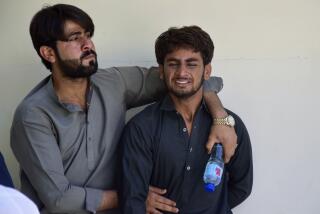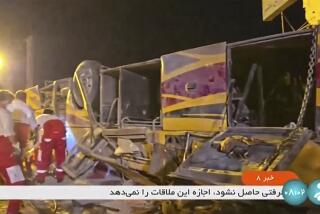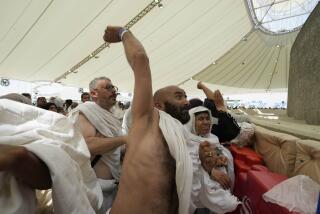Libyan rebels honor ‘martyrs’
Khaled Zarok Attghdi did not intend to go to war after he returned home to Libya from Manchester, England, four days ago to check on family.
He was 45, a food importer with four sons and a daughter, a man who knew little of guns. But when Moammar Kadafi’s troops attacked a rebel-held oil town Wednesday, Attghdi and a friend grabbed assault rifles and sped to the fight 130 miles south of this rebel stronghold.
On Thursday afternoon, in the harsh glare of winter sunshine, Attghdi’s body was covered with the raw red earth of Libya at crowded Al Haori cemetery. A rocket fired by Kadafi’s men had ended Attghdi’s life a day earlier just as rebel forces were fighting off the attack in Port Brega.
“He went there to fight, to help liberate his people,” said his close friend, Khaled Mohammed, 36, who bent down and removed his sunglasses to pray at the head of Attghdi’s casket.
On the simple concrete headstone that marked the grave, someone had carved in the wet cement a number: 194. Attghdi was a shaheed, a martyr, and he joined scores of others slain in the uprising and buried in Al Haori. Most died in clashes last month that drove Kadafi’s hated security forces from Benghazi, Libya’s second-largest city and the nominal capital of rebel-held eastern Libya.
In the same rough trench that formed Attghdi’s grave, another martyr was buried under the mournful gazes of men who suddenly shouted out, “God is great!”
This martyr, too, was given a numbered grave. He was Abdul Salam Nabus, 27, who had also rushed to Port Brega to fight the forces from the west.
He was one of three sons of Mohammed Nabus, who had traveled south to collect Abdul Salam’s body from a morgue. Now he stood with a hard, stoic expression on his weathered face, his head protected from the fierce sunlight by a checkered headdress. He did not weep.
“It was important to my son that he go and fight to make our country free,” Nabus said. “It was in his heart.”
His son’s friends, who fought beside him, told his father of the young man’s death late Wednesday in a government airstrike.
No one seemed to know how many rebel fighters died in the Port Brega battle. Estimates from the morgue in nearby Ajdabiya and the transitional government at the Benghazi courthouse range from nine to 14. Many more were wounded, including two friends who had driven south with Nabus in a state of heady excitement, his father said.
In other eastern towns, more rebels were buried who had rushed to the battle and were killed in the coastal sand dunes or along the roadways.
“There will be more martyrs,” Mohammed Nabus predicted. He uttered an oath against Kadafi.
And then he said, “I have two more sons. I’ll send them to fight the enemy, both of them together.”
Attgdhi’s friend, Mohammed, was still in shock over his death, just four days after returning from the relative serenity of Manchester.
Mohammed, who met Attghdi while working in Manchester, remembered every detail: How Attghdi, to his right, suddenly went down from a missile blast, and how a young fighter to his left also was struck and killed.
“Me, I got only a little wound on my head,” he said. It was covered by a red knit cap.
Mohammed said he understood why Attghdi decided so quickly to rush to Port Brega when they heard it was under attack. It made sense to him, even though Attghdi was here to find a way to reach Tripoli to check on his extended family.
“He went to Brega for the same reason I did: We both knew we had to help in the fight,” Mohammed said.
Mourners at the cemetery bore reminders of the fight against Kadafi. One man wore an arm band made from the pre-Kadafi flag that the rebels have been flying: bands of red, black and green with a white crescent moon and star in the center. Another waved the flag itself.
Several carried assault rifles. As the crowd of men broke into chants, bursts of gunfire aimed skyward echoed off the gravestones.
Soon the funeral was over and the men walked sadly toward the cemetery gates. A weeping man approached Mohammed Nabus, who wrapped him in his thick arms.
They embraced beside a trench that stretched like a black scar in the slanting afternoon shadows. Already a backhoe had reached a long yellow arm deep into the soft earth and gouged new gravesites that awaited more martyrs.
More to Read
Sign up for Essential California
The most important California stories and recommendations in your inbox every morning.
You may occasionally receive promotional content from the Los Angeles Times.











